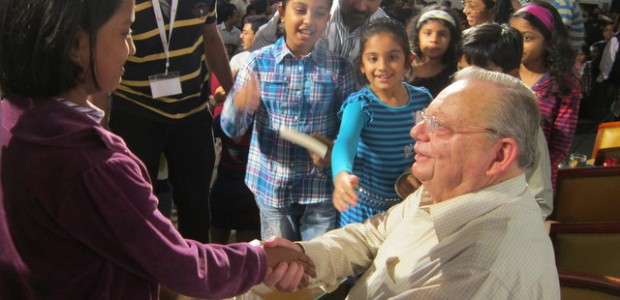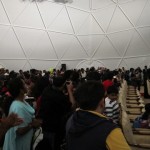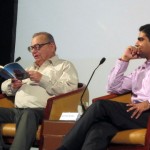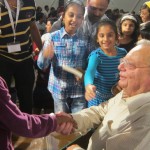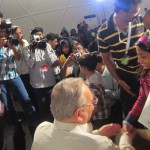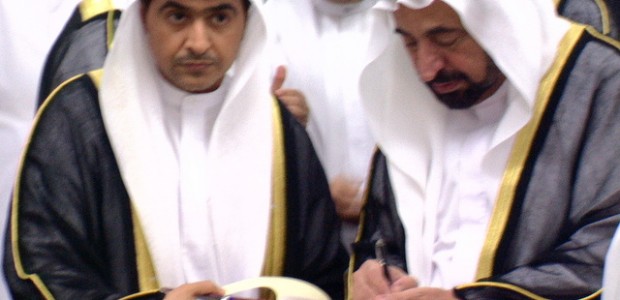
While visiting the Sharjah International Book Fair in the United Arab Emirates, I was pleased to find a panel in the program titled Between Classic and Electronic Creative Writing. What shape would a discussion on digital writing in the Middle East take?
The panellists were from diverse backgrounds – Ahmed Maaty (Egypt), Ibrahim Jrady (Syria) and Fadhel Thamer (Iraq) – and the discussion broad-ranging. The panel was both enlightening and frustrating. It was fascinating to gain a new cultural perspective on a topic that is so prevalent in the West. But, ultimately, the panel seemed to fetishise the ‘paper book’ overall and pass the buck to the ‘new generation’ to solve the challenges of new technology.
A caveat: the panel was in Arabic and I listened in through an interpretor, so some of the points in the complex discussion may have gotten lost in translation.
Fadhel Thamer spoke about facing the internet era and how the ‘old generation’ have avoided keeping pace with new technologies. However, the internet can no longer be avoided.
He noted the importance of panels like this, discussing technology and creative writing, and spoke about ‘the new creativity’: new modes of production across all kinds of narrative, including theatre. Despite a general wariness about the change in the literary landscape, he thinks it is vital to explore and embrace the possibilities as young people are increasingly choosing computers over books. ‘The new generation don’t like paper books,’ Thamer said, ‘they like the internet and computers. You can’t impose print so how can we as writers and publishers cope with this?’
One option is to look at books and find new ways to make them appealing. Interactive and collective writing is an option, as is writing poems and novels in digital formats. Thamer noted the excellent opportunities for discussion that digital writing creates, and how a blog with comments can be a place to develop and distribute a point of view. In narrative, a potential growth area is in metafiction or metanarrative works that integrate new technologies and are appealing to readers who are comfortable in the digital environment.
Ahmed Maaty questioned whether the book is losing importance and if we will need to change poetry and novels as we know them. Citing the changes in technology across the ages – from cave drawings to the printing press to the internet – he noted that, now as then, ‘what is important is the story, and the opinions’. As he eloquently added: ‘poems are not only poems when they are written in certain ways, they are poems when they touch our souls’.
Although initially concerned about the thought of technology violating private lives, he now sees the value in the internet as a tool for communication. Despite this promising opening, Maaty then spent a long time talking about the potential problems of digital writing. He fears for the increasing lack of connection between people that the internet era represents, and spoke at length about problems with intellectual property rights and writers making less money from rights and content because all the information is free. He said:
‘There has been a revolution in information giving but (paper) books lead to intellectual communication and discussions between people; technology has weakened the emotional humanitarianism between people.’
Maaty clearly fetishises print, stating, in an argument that readers of this site will be familiar with: ‘What is good about books is we can hug books, we can read them in bed’. Although a frustrating argument (digital publishing is not, after all, a zero sum game where ebooks will necessarily replace all print books), it made me smile to hear that this sentimental idea is echoed around the world.
Ibrahim Jrady, too, started with a promising premise, initially speaking on creativity. He noted that is is not the form that makes us artists, but the act of creating. However, he then posed the questions, ‘Is new technology better than paper books? Can the internet topple print?’, and answered them with a resounding ‘No’.
He cited the fact that bestselling writers of paper books are still the most read authors, the ingrained habit of reading print, and the beauty of having books and libraries in our homes. However, he thinks that young people won’t be into print books because they have never had an attachment to them, and so the question will be how to make the two forms complementary.
Jrady did, however, point out the problem with the panel; that they were all ‘old generation’. As an audience member it was frustrating to hear from a panel of middle aged male academics; I was longing to hear from a writer or publisher who was embracing the opportunities of digital publishing rather than studying them.
A more diverse perspective did come from the audience. A young female teacher commented that, rather than isolating people, reading digital books in her classroom encouraged sharing ideas, increasing the amount of discussion about the texts happening among the students.
Another audience member commented that technology is a reality which is past the point of discussion, an issue with which we have to deal practically. ‘What we need is to put an end to technological illiteracy,’ he said, noting that none of the panellists had thought to use any media, such as powerpoint, in their presentations. He spoke about the digital opportunities within the Arab world, and how publishers should be thinking about how to use the digital space to promote local authors and writers.
A final comment from the audience spoke about the possibilities of narratives in the digital space, and how new technologies can create vital spaces for limitless creativity and freedom.
From the tone of the audience comments, it seemed that many people felt the disconnect between the realities of what is actually happening in the digital space and the panel’s adversorial discussion about the battle between print and digital (a feeling that Australian audiences at some ‘future book’ events might be familiar with!).
Digital publishing in the Arab world is far less developed than in Australia, but it is interesting to note the similarities in how the industry is developing in this part of the world. Advances in digital creativity also seems to be writer- and reader- rather than publisher-driven, with industry discourse and publishers struggling to keep up. Although the uptake of creative technology is in its early stages, there are writersblogging and self-publishing in the UAE; however, there are currently few publishing houses creating ebooks and no Arabic ebooks available at all. As in Australia, there is a feeling of frustration that the infrastructure (funding bodies, major publishing houses, etc) is being slow to catch up with what is happening in the arena of new digital art forms.
There was one line of discussion among the panellists that celebrated the digital: that the internet poses amazing possibilities for increasing freedom of expression and political activism. ‘No one imagined that this electronic game could lead to revolutions in the Arab world,’ Thamer said.
Agreeing, Jrady noted that, ‘The internet positive for the Arab people because they are seeking freedom and the internet is a space of freedom. Young people are expressing their opinions online.’
With the recent events of the Arab Spring, in the Middle East there are more people than ever getting online to connect and commentate. In Australia there was a definite surge in creative digital output concurrent with increasing technical literacy that came with the large uptake of social media sites such as Facebook and then Twitter. As more became comfortable with reading and communicating online, publishers and creators alike saw the possibilities of digital writing, which has led to an increase in blogging, ebook publishing and the like. An increasing digital literacy in the Arab world, coupled with the democratic political possibilities of the online space, will no doubt lead to a similar situation, where more writers and publishers will use available technology to disseminate their work.
I think it’s important for Australia keep an eye on how diverse markets are tackling these issues – that is, not just looking to the US and Europe – to ensure that we can can continue to grow our digital industries as strategically and successfully as possible on both a local and global scale.





















